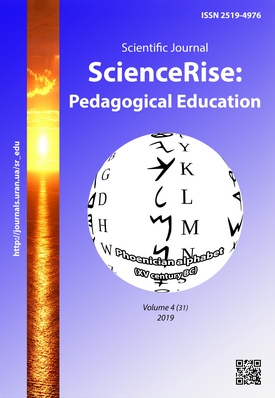Specifics of soft skills development of IT-students by the means of educational scrum projects
DOI:
https://doi.org/10.15587/2519-4984.2019.172007Keywords:
scrum, soft skills, software development, student of IT specialty, methodology of developmentAbstract
The article raises a problem of finding relevant and effective methods for the development of soft skills of future specialists in the area of informational technologies. As the starting point of the research the author defines a project work during which an independence and skills of solving problems in the subsequent professional activities are formed. The first section of the work examines the essence of soft skills and provides their classification. The author also highlights the most significant soft skills of an IT employee, including creativity, conflict management, critical thinking, presentation, leadership, communicative skills, flexibility, and gives a brief description of each of them. In the next section the author examines both monolith and agile types of software development methodologies, used in modern IT companies, making an accent on how the soft skills of professionals are implemented in the process of work. Particular attention is paid to the Scrum methodology, which is considered as the best polygon of development of non-technical skills of a specialist. The article also contains a description of the processes and project roles in Scrum. The last section of the work contains a detailed analysis of the use of soft skills at each stage of the Scrum methodology, confirming the effectiveness of it as a form of developing the soft skills of future IT specialists
References
- Alkhymovych, A. (2017). IT vymahaiut fakhivtsiv na styku haluzei. Novyny biznesu. Available at: https://biz.nv.ua/experts/it-trebujut-spetsialistov-na-styke-otraslej-1601716.html Last accessed: 30.06.2019
- Kravchenko, H. Yu. (2015). Tekhnolohiia orhanizatsii proektnoi diialnosti studentiv vyshchykh navchalnykh zakladiv. Bezpeka liudyny v suchasnykh umovakh. Kharkiv: NTU «KhPI», 138–146.
- Koval, K. (2015). Rozvytok soft skills studenta – odyn vazhlyvykh chynnykiv pratsevlastuvannia. Visnyk Vinnytskoho politekhnichnoho instytutu, 2, 162–167.
- Fedorova, O. V. (2018). Formation of hard skills, soft skills and digital skills of students of the Faculty of Information Technology of the Higher Education Management University of Management TISBI. Scientific Information Journal Vestnik TISBI, 2, 335–341.
- Taylor, E. (2016). Investigating the Perception of Stakeholders on Soft Skills Development of Students: Evidence from South Africa. Interdisciplinary Journal of e-Skills and Lifelong Learning, 12, 1–18. doi: http://doi.org/10.28945/3412
- Raitskaya, L. K., Tikhonova, E. V. (2018). Perceptions of soft skills by Russia’s university lecturers and students in the context of the world experience. RUDN Journal of Psychology and Pedagogics, 15 (3), 350–363. doi: http://doi.org/10.22363/2313-1683-2018-15-3-350-363
- Maksudova, E. (2018). Soft skills dlia IT. Chto vazhnee: znat Java ili umet dogovarivatsia? Available at: https://vc.ru/flood/39199-soft-skills-dlya-it-chto-vazhnee-znat-java-ili-umet-dogovarivatsya Last accessed: 30.06.2019
- Shymkovych, V. (2015). Kak hramotno «vospytyvat» dzhunyorov. Available at: https://dou.ua/lenta/articles/raising-juniors/ Last accessed: 30.06.2019
- Lvova, A. (2018). Zachem ynzheneru soft skills. Available at: http://habr.com/ru/company/epam_systems/blog/418621/ Last accessed: 30.06.2019
- Beck, K., Beedle, M., Bennekum, A., Cockburn, A., Cunningham, W., Fowler, M. et. al. (2001). Manifesto for Agile Software Development. URL: http://www.agilemanifesto.org/ Last accessed: 30.06.2019
- Schwaber, K., Sutherland, J. (2017). The Scrum Guide. Available at: https://www.scrumguides.org/docs/scrumguide/v2017/2017-Scrum-Guide-US.pdf Last accessed: 30.06.2019
- Omar, M., Ahmad Khasasi, L., Abdullah, S., Hashim, L., Romli, R., Katuk, N. (2018). Defining Skill Sets Requirements for Agile Scrum Team Formation. Journal of Engineering and Applied Sciences, 13, 784–789.
Downloads
Published
How to Cite
Issue
Section
License
Copyright (c) 2019 Олександр Олександрович Гура

This work is licensed under a Creative Commons Attribution 4.0 International License.
Our journal abides by the Creative Commons CC BY copyright rights and permissions for open access journals.
Authors, who are published in this journal, agree to the following conditions:
1. The authors reserve the right to authorship of the work and pass the first publication right of this work to the journal under the terms of a Creative Commons CC BY, which allows others to freely distribute the published research with the obligatory reference to the authors of the original work and the first publication of the work in this journal.
2. The authors have the right to conclude separate supplement agreements that relate to non-exclusive work distribution in the form in which it has been published by the journal (for example, to upload the work to the online storage of the journal or publish it as part of a monograph), provided that the reference to the first publication of the work in this journal is included.








